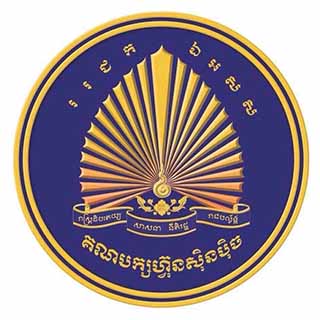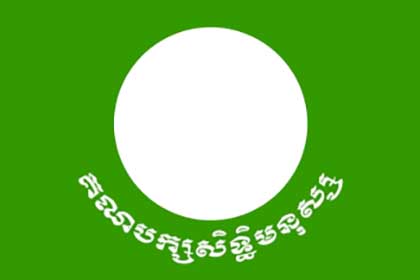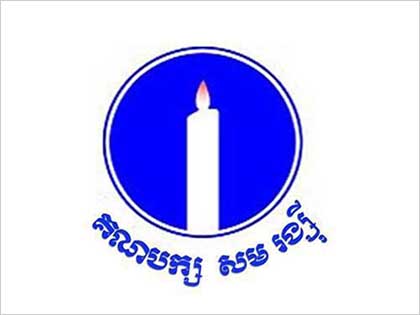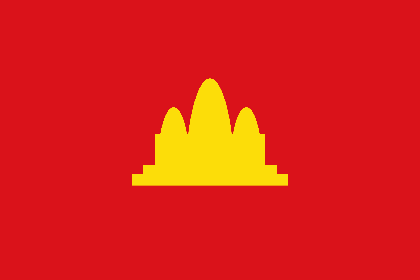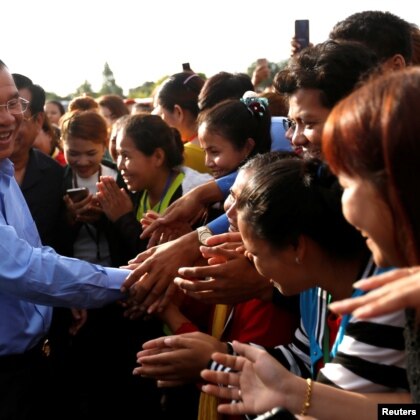
Garment workers, a powerful voting block long aligned with the opposition, greet Cambodia's Prime Minister Hun Sen at a provincial rally on May 30, 2018. (Samrang Pring | Reuters)
Community Stories
Cambodian Government Leans on Civil Servants for Votes
The politicization of public institutions is forcing many civil servants to campaign for the ruling Cambodian People’s Party during office hours, VOA finds.
Phnom Penh On July 7, campaigning kicked off for Cambodia’s national elections and in the capital Phnom Penh, Prime Minister Hun Sen addressed a large rally of supporters and members of his Cambodian People’s Party (CPP) ahead of the July 29 vote.
In a typical speech, he said he would defend Cambodia from unspecified threats to peace and stability, and he claimed to have thwarted a revolution attempt by using “strong legal measures” to dissolve his main opposition challenger, the Cambodia National Rescue Party (CNRP), last year.
Hun Sen then turned to some strategic voter groups, promising to raise the minimum wage for garment workers - a key urban demographic that has been largely supportive of the CNRP in the past - while he also committed to higher salaries for the armed forces and civil servants.
When it comes to the latter two groups of state employees, however, the CPP has long relied on more than just salary raises to ensure that they support the CPP at the polls and during their state duties.
During Hun Sen’s three-decade rule, his once-communist CPP has maintained the idea that the party and the state are inseparable and – through patronage and threat – has sought to bring as many state employees into the party, which now claims a reported 5.5 million members nationwide.
The military and police force have been heavily politicized in violation of Cambodia’s law requiring political neutrality, with dozens of commanders joining the CPP and openly campaigning for it, the U.S.-based Human Rights Watch said in a June 28 report, adding that the armed forces had also carried out numerous alleged rights abuses against opposition members.
The subversion of the independence of other state institutions and the civil servant force has been less brazen, though political partisanship is sometimes openly promoted among civil servants, with one CPP minister publicly telling them last year that “anybody who does not support the CPP, can submit applications of resignation.”
Ahead of the July 29 elections, a VOA investigation uncovered new details and internal party documents that show how the CPP pressured state employees into becoming party members and ordered them to publicly promote the party.
The practices occur across various public institutions and violate a Cambodian law that forbids and penalizes the use of state positions and state facilities for or against a political party or candidate.
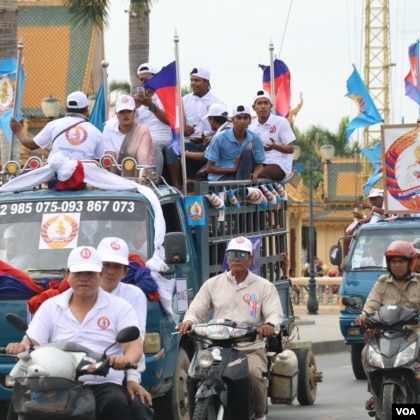
The ruling Cambodian People's Party launches the official campaign season for the sixth general election in Phnom Penh, on July 7, 2018. (Sun Narin | VOA Khmer)
‘If we don’t go campaign the boss will notice’
One civil servant put to use by the CPP is Dara, 29, who has worked at the General Department of Taxation of the Ministry of Economy and Finance for three years. When campaigning started on July 7, a Saturday, Dara was not at home with his young family as usual.
“I went to Kandal Province to campaign for the CPP. I have to join it since it is an important day for the CPP,” said Dara, who – like many civil servants interviewed for this story - asked that his real name be withheld for fear of repercussions for discussing the practices.
“If we don’t go campaign the boss will notice and will think I am unsupportive,” he said, adding that he was sent to Ariksat Commune by his department head who directed his staff to campaign on the weekend or take leave days for this purpose.
VOA interviewed half a dozen other civil servants - school teachers, Ministry of Education officials and National Bank of Cambodia staff – who said they had long felt pressured to join the CPP and recently had campaigned for it in order to retain their jobs.
“When I started, the principal asked me if I was registered with the CPP. If we don’t register our name, we will be accused of being opposition party member or activist.”
Further research among social media users revealed that many civil servants, whose Facebook pages indicate their public positions, have taken their partisanship online. Dozens can be seen in photos of them attending recent CPP rallies, donning campaign gear and holding CPP flags.
“I just follow the others, everyone does it. How can I be an outsider?” said Dara. He joined the CPP soon after starting his job and was also instructed to campaign in the 2017 Commune Elections.
Sokha, 29, said he was expected to join the CPP from the moment he began working as a high school teacher in Phnom Penh six years ago.
“When I started, the principal asked me if I was registered with the CPP. If we don’t register our name, we will be accused of being opposition party member or activist,” he said. “This happens to all civil servants, including teachers, medical professionals and police.”
Rong Chhun, a former teachers’ union leader and advisor to the Cambodian Independent Teachers’ Association, confirmed the practice was widespread, adding that it undermined the independence and quality of the country’s education system.
“If we want to have a strong public institution, it should be independent and stay away from political party influence. But unfortunately, we observe nowadays that state institutions serve (a) political party more than the state,” he said.

Garment workers attend a rally with Cambodia's Prime Minister Hun Sen in Kandal province, Cambodia on May 30, 2018. (Samrang Pring | Reuters)
Organizing civil servants into campaign teams
VOA gained access to a group chat for 103 CPP-affiliated government officials in the Ministry of Economy and Finance in which instructions, meetings and activities to support the party were being shared, along with internal party directives and information about public works that the CPP could claim credit for.
A directive issued by Kandal Province’s CPP headquarters on April 4, 2018, to its CPP members in the province states that Minister of Economy and Finance Aun Pornmoniroth, a CPP Executive Committee member, is in charge of promoting the CPP in Kandal’s Khsach Kandal and Lvea Aem districts for this year’s elections.
The directive states that various officials in the ministry are responsible for different areas in Kandal, with a deputy director general put in charge of each specific commune, which means that his or her staff will be send to these areas.
The letter instructs local CPP members in Kandal to help these civil servants from the ministry when they come to promote the CPP in local communities.
Dara, who is in the Telegram chat group, said he has been ordered to join a CPP Kanak Pungreung, or Strengthening Team, to promote the party in Ariksat Commune.
He and his Tax Department colleagues, he said, “are being watched” at the office to monitor their participation and, “If the commune loses the election, the officials who are responsible for that commune will be blamed.”
Since March, he has had to visit Ariksat Commune villages several times per month to dole out gifts to residents in order to boost the CPP’s local reputation. Recently, he provided 50 kilograms of rice each to families who had experienced a recent death or a birth in the family.
“The commune chief prepared all of the donations. We just go and represent party,” Dara said. “We just pay the money, like 200,000 riels ($50), to the commune chief (for the donations) and we can claim back the money at office.”
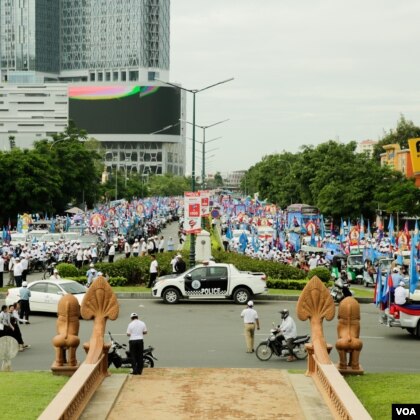
On the first day of campaigning for the July 29 elections, supporters of the ruling Cambodian People’s Party clogged Phnom Penh streets on July 7, 2018. (Ty Aulissa | VOA Khmer)
‘Anybody who does not support the CPP, submit your resignation’
CPP spokesman Sok Eysan played down questions by VOA on whether the longstanding practices by the party undermined the independence of civil servants and public institutions.
He said individual citizens have the right to be party members as long as it does not interfere with their work. “It doesn’t mean all civil servants are required to join the party. Our party principles don’t force anyone to join it,” he said.
“If anybody does not support the CPP, submit your resignation and I can help you [with that]. But if you are loyal to the CPP you must vote for the CPP and then you can stay.”
Last August, Minister of Social Affairs, Veterans and Youth Rehabilitation Vong Sauth made it abundantly clear, however, what is expected of Cambodia’s state employees.
“Officials eat the state’s salary and are asked to be neutral, but do not forget that the state was born from the party. I think all of our officials must have the clear character of firmly supporting the party,” he reportedly told a gathering of newly promoted officials. “If anybody does not support the CPP, submit your resignation and I can help you [with that]. But if you are loyal to the CPP you must vote for the CPP and then you can stay,” he said.
Despite such pressures on Cambodia’s more than 200,000 civil servants and the CPP’s impressive membership numbers among a nation of 15.5 million, Hun Sen’s party only beat the CNRP in the 2013 elections with a narrow majority in a disputed result that sparked widespread protest.
The voting result caused suspicions among the CPP leadership over a lack of loyalty among civil servants and party members when they cast their vote in secret at the ballot box.
After the government dissolved the opposition party and jailed its leader Kem Sokha last year, civil servants and CPP members now no longer have the option to privately vote for a political alternative to the ruling party.
Dara said the CPP’s politicization of public institutions or alternative political preferences are not discussed among civil servants out of fear that it would endanger their jobs or promotions.
“I never talk about whether I joined the party out of genuine support. What if we talk to people who are really strong party members or supporters? We will be done for,” he said. “It is difficult to address or protest (the CPP’s influence) as the party is powerful.”






